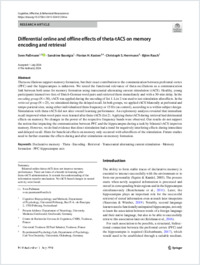Differential online and offline effects of theta‑tACS on memory encoding and retrieval
PSPE
- Paßmann, Sven ORCID Cognitive Biopsychology and Methods, Department of Psychology, Université Fribourg, Switzerland. Department of Neurology, University Medicine Greifswald, Germany
- Baselgia, Sandrine ORCID Cognitive Biopsychology and Methods, Department of Psychology, Université Fribourg, Switzerland
- Kasten, Florian H. ORCID Centre de Recherche Cerveau & Cognition, CNRS, Toulouse, France. Université Toulouse III Paul Sabatier, Toulouse, France
- Herrmann, Christoph S. ORCID Experimental Psychology Lab, Department of Psychology, Carl Von Ossietzky Universität, Oldenburg, Germany
- Rasch, Björn ORCID Cognitive Biopsychology and Methods, Department of Psychology, Université Fribourg, Switzerland
- 2024
Published in:
- Cognitive, Affective, & Behavioral Neuroscience. - Springer. - 2024
Declarative memory
Theta
Encoding
Retrieval
Transcranial alternating current stimulation
Memory formation
PFC-hippocampus axis
English
Theta oscillations support memory formation, but their exact contribution to the communication between prefrontal cortex (PFC) and the hippocampus is unknown. We tested the functional relevance of theta oscillations as a communication link between both areas for memory formation using transcranial alternating current stimulation (tACS). Healthy, young participants learned two lists of Dutch-German word pairs and retrieved them immediately and with a 30-min delay. In the encoding group (N = 30), tACS was applied during the encoding of list 1. List 2 was used to test stimulation aftereffects. In the retrieval group (N = 23), we stimulated during the delayed recall. In both groups, we applied tACS bilaterally at prefrontal and tempo-parietal sites, using either individualized theta frequency or 15 Hz (as control), according to a within-subject design. Stimulation with theta-tACS did not alter overall learning performance. An exploratory analysis revealed that immediate recall improved when word-pairs were learned after theta-tACS (list 2). Applying theta-tACS during retrieval had detrimental effects on memory. No changes in the power of the respective frequency bands were observed. Our results do not support the notion that impacting the communication between PFC and the hippocampus during a task by bilateral tACS improves memory. However, we do find evidence that direct stimulation had a trend for negatively interfering effects during immediate and delayed recall. Hints for beneficial effects on memory only occurred with aftereffects of the stimulation. Future studies need to further examine the effects during and after stimulation on memory formation.
- Faculty
- Faculté des lettres et des sciences humaines
- Department
- Département de Psychologie
- Language
-
- English
- Classification
- Psychology
- License
- Open access status
- hybrid
- Identifiers
-
- DOI 10.3758/s13415-024-01204-w
- ISSN 1531-135X
- Persistent URL
- https://folia.unifr.ch/unifr/documents/329061
Other files
Statistics
Document views: 98
File downloads:
- s13415-024-01204-w: 125
- 13415_2024_1204_moesm1_esm: 35

